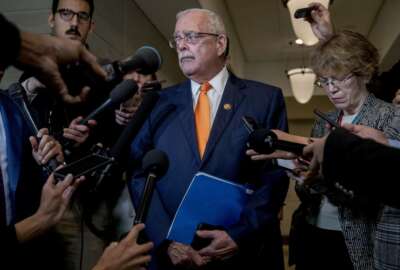
GOP bill to return feds to the office clears the House
The House is planning a floor vote for the SHOW UP Act, a Republican-led bill that would return the federal workforce to pre-pandemic office arrangements.
A bill that would return much of the federal workforce to in-office work arrangements cleared the House on Wednesday.
The Stopping Home Office Work’s Unproductive Problems — or “SHOW UP” — Act would return all currently teleworking federal employees who were working in the office prior to the pandemic back to their former work locations. The Republican-led bill passed mostly along party lines in a vote of 221-206. The bill has 26 Republican cosponsors.
House Oversight and Accountability Committee Chairman James Comer (R-Ky.), who introduced the SHOW UP Act on Jan. 11, said the bill wouldn’t fully eliminate telework for federal employees, but it would largely reduce it.
“We’re not saying nobody can telework,” Comer said during a Jan. 30 press conference. “There’s always going to be workers that telework, for various reasons … We just want those levels back to what they were before COVID.”
The bill has a relatively low chance of being enacted, given that Democrats are largely in favor of expanded telework for federal employees, and still hold the majority in the Senate. But Comer’s legislation may reveal some of the priorities of the House Oversight and Accountability Committee this Congress.
The high costs of federal leases in Washington, D.C. is a major driver for returning federal employees to their offices, according to Comer. He noted that D.C. Mayor Muriel Bowser has pushed for agencies to either return employees to federal office spaces, or otherwise give up their D.C. leases.
“If we’re not going to use those buildings for federal workers, then the federal government may look at doing something different with those buildings,” Comer said. “I don’t think we need to sit on very expensive buildings, if we’re not going to have federal workers who are coming to work.”
Comer has also pointed to “cumbersome” backlogs and delays at agencies such as the IRS, the Social Security Administration and the Department of Veterans Affairs as a major reason for feds to return to in-person office spaces.
“Federal agencies are falling short of their missions. They are not carrying out their duties. They are failing the American people,” Comer said at a Jan. 30 House Rules Committee hearing.
In contrast, many Democrats, such as the Oversight Committee’s Ranking Chairman Jamie Raskin (D-Md.), as well as Rep. Gerry Connolly (D-Va.), have argued that telework is a critical tool to improve federal workforce recruitment and retention — something that has been a longstanding challenge in the public sector.
“Telework saves money, helps the government recruit top talent, reduces traffic gridlock, makes environmental sense and ensures a continuity of operations at agencies that families, businesses, veterans and others rely on every day,” Raskin said at the committee hearing. “Ultimately, it doesn’t matter where someone’s getting their work done. It matters that the work is getting done, and that the public is receiving the services and the benefits that they pay for.”
“The SHOW UP Act is a backwards-looking piece of legislation that will leave the federal government less competitive with the private sector, less able to recruit the next generation of talent and less equipped to handle future public health emergencies,” Connolly said in an email to Federal News Network, adding that the legislation would “drag us back to a 2019 understanding of American workers and their productivity.”
Connolly, along with Rep. John Sarbanes (D-Md.) introduced the Telework Metrics and Cost Savings Act last Congress — a bill that would task agencies with gathering data on the benefits of telework for the federal workforce. The congressmen noted that telework and reducing the physical federal footprint would also lead to cost savings for the federal government.
Additionally, Connolly, as well as Rep. Abigail Spanberger (D-Va.), submitted several amendments to the SHOW UP Act, that would require collecting data on the benefits of telework, such as cost savings for taxpayers, and improvements to federal recruitment and retention. One amendment from Spanberger would additionally require agencies to analyze how telework policies impact military spouse employment.
Some federal unions and advocacy organizations were quick to criticize the SHOW UP Act after its introduction. The American Federation of Government Employees urged House leaders to first review the bill in the Oversight Committee, instead of pushing it to a floor vote.
“The bill would actually compel agencies to revoke provisions of existing collective bargaining agreements that were negotiated after the beginning of the pandemic, which provide telework and remote work arrangements that all sides have agreed to and that agencies have viewed as benefiting their missions,” AFGE Legislative Director Julie Tippens said in a Jan. 30 letter to House Rules Committee leaders. “To revoke these arrangements with 30 days’ notice, as the bill requires, would cause a significant disruption to current agency operations and likely harm productivity.”
The bill has also gained attention on social media, including on multiple Reddit threads. Many users voiced concerns about Republicans’ introduction of the SHOW UP Act, saying it could cause problems for agencies when it comes to recruitment and retention.
“They don’t seem to understand that the workers who don’t want to work in the office will just leave to find a private company who allows them to stay home,” one Reddit user wrote.
Copyright © 2025 Federal News Network. All rights reserved. This website is not intended for users located within the European Economic Area.
Drew Friedman is a workforce, pay and benefits reporter for Federal News Network.
Follow @dfriedmanWFED





